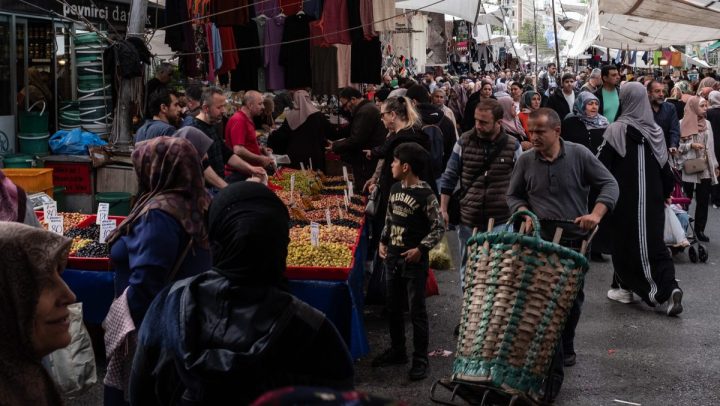
Turkey’s soaring food prices take center stage in presidential election
Turkey’s soaring food prices take center stage in presidential election

The price of food has become a central theme in Turkey’s presidential election, which is arguably the most important leadership contest for the country in a generation. That’s because polls show the economy is the top concern for voters.
Kemal Kilicdaroglu, the opposition candidate backed by six opposition parties challenging President Recep Tayyip Erdogan, has used onions as a prop in campaign videos from his kitchen table warning the already high price of the cooking staple — and other food necessities — will spike if the president is reelected. Erdogan fired back that he’s already solved the food-price problem and declared “there is no onion problem” in Turkey.
But on the streets of Ankara, people will tell you food inflation has gotten out of control.
On weekday mornings, it has become a habit for many people to stop by one of 421 public bread kiosks throughout the capital. The independently run shops sell government-subsidized loaves in the city of more than 5 million people.
Emrah Dogan has been managing one of the kiosks for about a year. In that time, he said he’s seen a 20% increase in the number of people who come: Some are by themselves for a single loaf, others with their children in tow on the way to school who pick up four or five loaves.
Dogan said he sells 900 loaves every day to about 200 people. His average customer used to be older, but now he’s seeing young families.

Murat is one such customer. He’s a married, private-sector worker with a daughter at home. We’re not using Murat’s last name because he fears political retribution.
“We try to go to supermarkets, but you can’t always go to the same supermarkets because prices keep changing. So we try to find ones that are relatively cheaper,” he said.
Annual inflation in Turkey surged to a 25-year high last year before official figures showed it topped out at 85.5%. The government has boosted minimum wage and subsidized household energy bills, which has helped relieve some of the pain. The inflation rate came down to 43.7% in April from a year ago — that decline was largely down to the high rate it was compared with the year before.
Adding to the pressure on households, the president has not allowed the country’s central bank to raise interest rates to combat rising prices. Workers like Murat are acutely feeling the effects of those decisions.
“We don’t get any support from other family members because everyone has their own problems,” Murat said. Often in Turkey, families offer financial or physical support with food deliveries for those who have trouble affording it.

“We are worried. If you are not able to buy what you want, you are not able to eat what you want in this country. Everything is expensive,” he said. “For the last five years, things have changed. Turkey is no longer Turkey.”
Supermarket shelves across the capital often sit packed with produce many people cannot afford. It often rots before it sells. This is all leading to what Candan Turkkan, a professor studying food security at Istanbul’s Ozyegin University, calls hidden poverty.
“In cities, poverty hides in specific neighborhoods, but it is jumping into more middle-class neighborhoods. You see more and more people preferring to go to hard-discount supermarkets.”
It’s impossible to know what proportion of their incomes families are spending on food now because Turkey’s statistics agency stopped publishing that data in 2019. But figures from the international agency the Organization for Economic Cooperation and Development showed that food prices in Turkey surged 69.3% in February from last year. That’s far higher than the average of its member countries.
The reason for food-price inflation is multifaceted, Turkkan said. Part of the solution, she argued, involves changes at the government level to increase support to farmers, and those in the agricultural industry to encourage better land husbandry and more production for the local market.
“We have switched to a food system that encourages importing of food,” Turkkan said. “When you have that, you are almost always vulnerable to inflation or currency depreciation. If your economy is fragile, your food system is going to be fragile. We grow a lot of fresh fruit and vegetables — a significant chunk — then ship it off to somewhere else. And increasingly we import what we eat.”
Not everyone at the bread kiosks agreed there’s an economic problem. One woman said she chalks it all up to so-called foreign forces meddling in the Turkish economy. That’s a common argument from the president’s AK Party. She said the election has made the economic issues more prominent and now people are focused on them.
But another woman simply pointed to her bag of three loaves and said, “I’m buying bread from here. That says everything you need to know about the economy.”
For his part, Murat said a change of government is what it will take to change his country’s economic fortunes. Indeed, on May 14, voters will decide whether to add another five years to Erdogan’s 20-year grip on power or put their economic hopes in the hands of an untested opposition alliance.

There’s a lot happening in the world. Through it all, Marketplace is here for you.
You rely on Marketplace to break down the world’s events and tell you how it affects you in a fact-based, approachable way. We rely on your financial support to keep making that possible.
Your donation today powers the independent journalism that you rely on. For just $5/month, you can help sustain Marketplace so we can keep reporting on the things that matter to you.











